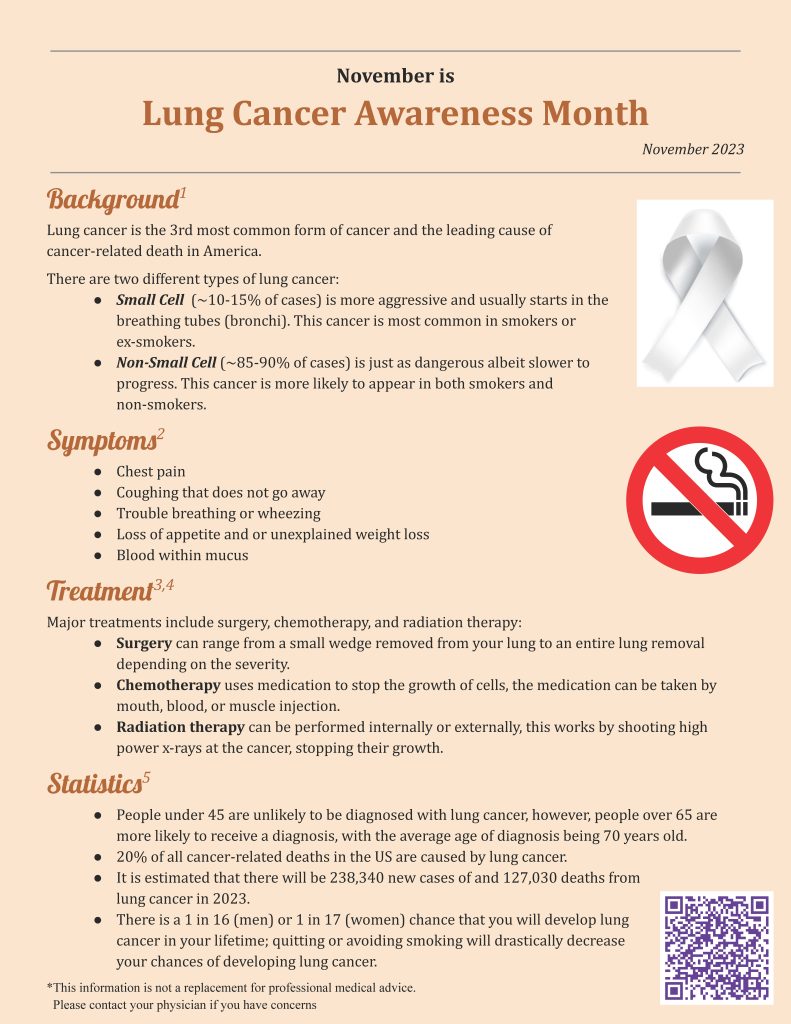This announcement comes from the American Cancer Society on Campus student organization.

November is: Lung Cancer Awareness Month
Background [1]
Lung cancer is the 3rd most common form of cancer and the leading cause of cancer-related death in America.
There are two different types of lung cancer:
● Small Cell (~10-15% of cases) is more aggressive and usually starts in the breathing tubes (bronchi). This cancer is most common in smokers or ex-smokers.
● Non-Small Cell (~85-90% of cases) is just as dangerous albeit slower to progress. This cancer is more likely to appear in both smokers and non-smokers.
Symptoms [2]
● Chest pain
● Coughing that does not go away
● Trouble breathing or wheezing
● Loss of appetite and or unexplained weight loss
● Blood within mucus
Treatment [3,4]
Major treatments include surgery, chemotherapy, and radiation therapy:
● Surgery can range from a small wedge removed from your lung to an entire lung removal depending on the severity.
● Chemotherapy uses medication to stop the growth of cells, the medication can be taken by mouth, blood, or muscle injection.
● Radiation therapy can be performed internally or externally, this works by shooting high power x-rays at the cancer, stopping their growth.
Statistics [5]
● People under 45 are unlikely to be diagnosed with lung cancer, however, people over 65 are more likely to receive a diagnosis, with the average age of diagnosis being 70 years old.
● 20% of all cancer-related deaths in the US are caused by lung cancer.
● It is estimated that there will be 238,340 new cases of and 127,030 deaths from lung cancer in 2023.
● There is a 1 in 16 (men) or 1 in 17 (women) chance that you will develop lung cancer in your lifetime; quitting or avoiding smoking will drastically decrease your chances of developing lung cancer.
*This information is not a replacement for professional medical advice. Please contact your physician if you have concerns.
References
[1]. What is lung cancer? (2023, January 12). American Cancer Society.
https://www.cancer.org/cancer/types/lung-cancer/about/what-is.html
[2] Signs and symptoms of lung cancer. (2019, October 1). American Cancer Society.
https://www.cancer.org/cancer/types/lung-cancer/detection-diagnosis-staging/signs-symptoms.html
[3] Treating small cell lung cancer. (n.d.). American Cancer Society. https://www.cancer.org/cancer/types/lung-cancer/treating-small-cell.html
[4] Treating non-small cell lung cancer. (n.d.). American Cancer Society. https://www.cancer.org/cancer/types/lung-cancer/treating-non-small-cell.html
[5] Key statistics for lung cancer. (2023, January 12). American Cancer Society. https://www.cancer.org/cancer/types/lung-cancer/about/key-statistics.html